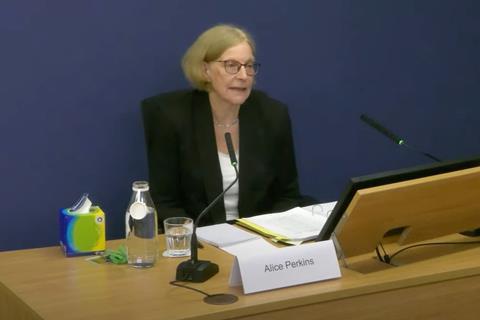The former chair of the Post Office has said she cannot understand why lawyers held back damning reports from her board – but she stressed this did not automatically point to a cover-up.
The oral evidence of Alice Perkins to the Post Office Inquiry yesterday focused heavily on the actions of Susan Crichton, who was general counsel during the first half of her four-year spell as chair.

Perkins, who was appointed chair in 2011, said it was ‘extraordinary and highly regrettable’ that information showing that Horizon was unsafe and should not have been relied upon for prosecutions was not provided to the board.
Two pieces of legal advice from mid-2013 showed serious flaws with the expert witness called in several prosecutions by the Post Office. Perkins said she and her fellow board members were given an ‘incomplete picture’ of Horizon’s integrity and that advice was not passed on by Crichton.
‘I look back at these omissions and I feel very badly let down by them,’ Perkins wrote in her witness statement.
Asked by inquiry counsel Jason Beer KC why Crichton appeared to have held back key pieces of legal advice, Perkins said: ‘I am a believer in the cock-up rather than the conspiracy theory of life. I tend not to think people in large complex organisations are conspirators. I really do not know why [sharing the legal advice] didn’t happen. It is extraordinary that it didn’t happen. If you read the advice there is no mistaking what it’s saying.’
Beer asked: ‘Was this done to prevent an emerging scandal from surfacing?’
Perkins replied: ‘I wish I knew. I just don’t understand it. For a general counsel to receive advice like that, to put it at its lowest, it would be in your best interests to show it, wouldn’t it?’
The inquiry also heard that Crichton was shut out of a board meeting in July 2013 on Perkins’ instruction when the lawyer had been due to present a paper on Horizon and the question of whether to review convictions.
Perkins suggested that Crichton, described by Beer as being treated like a ‘naughty schoolgirl’ being made to wait outside the meeting, was going to be subject to criticism from board members and she wanted to encourage open discussion. 'I felt we would not be able to have the discussion we needed to have in the board if [Crichton] was present throughout. I knew there were going to be critical questions raised about the way she handled things,’ Perkins said.
Beer said: ‘You sat [Susan Crichton] outside [the board meeting] on a chair and then criticised her failure to reveal information to you as shocking and astonishing.’
Perkins said: ‘It is perfectly true she didn’t have the opportunity to mention that to the board at the meeting. [But] two pieces of advice of that nature shouldn’t just be reported orally, they should have been the subject of some kind of written note – a proper paper saying we have had this advice. The findings of the advice and its implications should have been brought to the board.’
Perkins’ evidence is due to continue today.






























